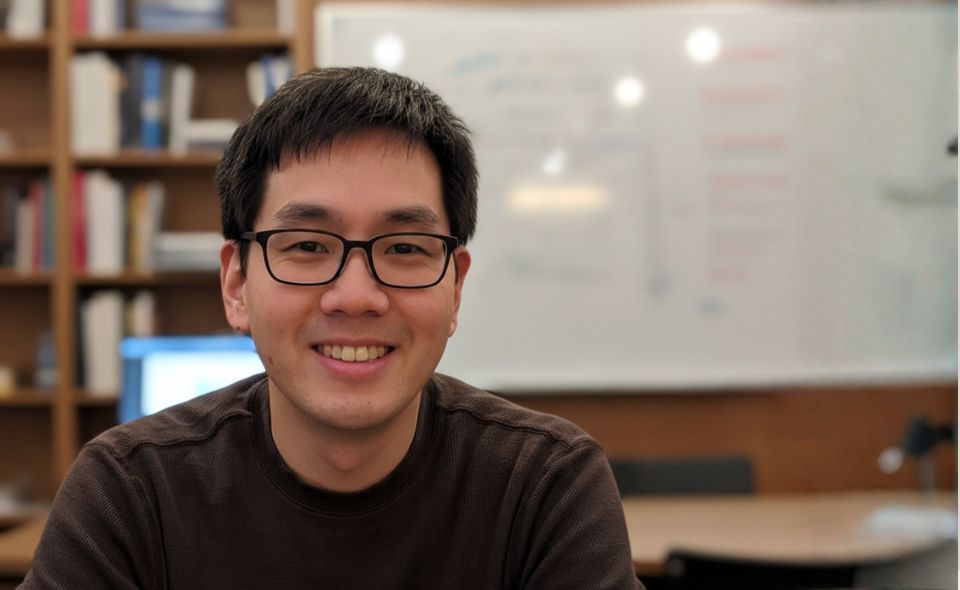

When Columbia University launched the Data Science Institute more than a decade ago, Daniel Hsu, who joined the Department of Computer Science in 2013, was among the early faculty helping define what data science could mean at Columbia. A specialist in algorithmic statistics and machine learning, Hsu has helped shape the Institute’s growth from its earliest days through his work on the theoretical foundations of data science, practice-driven research, and community-building initiatives. From pioneering interdisciplinary collaborations – such as applying machine learning to study dark energy in the universe – to mentoring postdoctoral fellows and co-chairing DSI’s Foundations of Data Science Center, Hsu has played a key role in advancing the Institute’s mission to foster data-driven discovery.
We have an opportunity to explore new research directions and bring the campus together at a time when AI is making a huge impact.
– Daniel HsuNow, as the Institute’s new Associate Director for Research, he is poised to guide the next chapter of that story, strengthening collaboration across Columbia and helping position the Institute at the forefront of interdisciplinary research in artificial intelligence.
From Curiosity to Collaboration
Hsu describes his motivation simply: “I like learning new things and solving puzzles,” he says. “The kind of research I work on involves a lot of those activities, and they are often done collaboratively, which makes them especially fun.”
That spirit of curiosity and collaboration has shaped Hsu’s career at Columbia. One of his earliest interdisciplinary projects began in 2015 with a DSI Seed Fund grant, which brought Hsu together with Astronomy Professor Zoltan Haiman to apply machine learning to the study of dark energy.
“At the time, I had no idea why this kind of collaboration would make sense,” Hsu recalls. “But the seed grant motivated us to start talking, and it led to a very fruitful project.” What began as an unlikely pairing grew into a NASA-supported research program using deep learning to map dark matter and better understand the universe’s expansion.
Working with Haiman’s team, Hsu applied machine learning and image analysis to high-resolution astronomical images of more than a billion galaxies. By tracking faint distortions in light caused by unseen dark matter—a phenomenon known as weak gravitational lensing—the researchers uncovered new insights into how dark matter is distributed and how dark energy influences cosmic structure.
The initial Institute funded effort led to multi-year support from NASA’s Astrophysics Theory Program, resulting in several influential publications on using deep learning for cosmology.
“This is at the heart of what makes the Institute so special,” Hsu says. “It brings together people from very different research areas and uses data science to connect them in ways that wouldn’t otherwise happen.”
Building the Foundations of Data Science
Hsu’s leadership in foundational research at Columbia spans nearly a decade. In 2015, he and Electrical Engineering Professor John Wright launched one of the first seminar series dedicated to the theoretical principles underpinning data science. Then, from 2017 to 2022, Hsu, Wright, and five other Columbia faculty helped lead an NSF-funded Transdisciplinary Research in Principles of Data Science (TRIPODS) Institute, which supported seminars, tutorials, and workshops that connected theory with practical data science applications.
Since 2022, Hsu has partnered with Professor of Statistics Samory Kpotufe as co-chair of the Institute’s Foundations of Data Science Center. Together, they have fostered a vibrant network of scholars exploring how algorithms learn, adapt, and interact with complex data. “Becoming co-chair of the Foundations Center was a natural step,” Hsu says. “It allowed me to continue to bring together researchers around the fundamental questions that drive our field.”
A Vision for Research and Collaboration
In his new role as Associate Director for Research, Hsu is focused on core programs in the Institute’s research ecosystem, particularly the Seed Fund and Postdoctoral Fellows programs, both of which have had a direct impact on his own career. “All three of my former postdocs were appointed through the Institute,” he notes. “And my work on machine learning and cosmology started with an Institute seed grant. I’m happy to pay it forward by supporting these programs for others at Columbia.”
Hsu also aims to deepen engagement across the Institute’s eight research centers, helping them strengthen their programming and foster new collaborations. “Having been a co-chair myself, I understand what’s needed to help these centers achieve their goals,” he says. “My emphasis is on making sure both theoretical and applied research are equally well supported.”
Looking Ahead: AI and the University’s Future
As artificial intelligence reshapes research and education, Hsu sees the Data Science Institute playing a central role in guiding Columbia’s response.
“The Institute is well-positioned to help the university make sense of how AI is influencing every aspect of our lives,” he says. “We have an opportunity to explore new research directions and bring the campus together at a time when AI is making a huge impact.”
For Hsu, that vision aligns perfectly with what has always driven his work. “Data science connects so many different areas of inquiry,” he says. “It’s about learning, collaboration, and pushing the boundaries of what’s possible – and that’s exactly what makes being part of the Institute so rewarding.”